As the next of my series featuring fantastic female fantasy authors (see disclaimer) I’ve invited the talented powerhouse Anita Bell to drop by.
Watch out for the give-away question at the end of the interview.
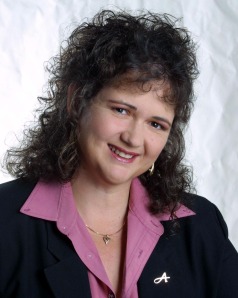 Q: First of all, major congratulations on Diamond Eyes winning the 2011 Hemming Award for Excellence in Science Fiction and Fantasy Themes. Since this is award is not necessarily awarded every year, winning must have come as a wonderful and welcome surprise. Did you consciously set out to explore the themes of race, gender, sexuality, class and disability in the book?
Q: First of all, major congratulations on Diamond Eyes winning the 2011 Hemming Award for Excellence in Science Fiction and Fantasy Themes. Since this is award is not necessarily awarded every year, winning must have come as a wonderful and welcome surprise. Did you consciously set out to explore the themes of race, gender, sexuality, class and disability in the book?
Actually, Diamond Eyes is a story about freedom and independence. But since my main character is a young woman who is blind, sexually inexperienced, and misdiagnosed by nursing staff who all treat her as crazy as well as handicapped, all those other themes grew organically in a way that also resonated strongly and unanimously with the judging panel.
Sad but true; while working for ten years in a mental health facility, I saw young men and women routinely castrated or medicated to suppress their sexual development, often without their knowledge or consent (due to the fact they’d been declared unfit to make such decisions on their own). So this part of Mira’s story is inspired by a young handicapped couple I met, who’d both been disabled through a contagious disease, but eventually regained their independence through modern medications and therapies – and when it came time that they’d recovered enough to have healthy children, it was too late. They’d both been “cared for” in their best interests.
[youtube=http://www.youtube.com/watch?v=LkbKh4hGmSU]
Q: Following on from that, we were part of the QUT Cohort doing a Masters while writing a book. You produced Diamond Eyes. What was the research question you were exploring with this book?
Funny story: It started out as;
How can I crack the big markets overseas and for movies?
But since that was too big a question for a masters and required too many non-existent definitions about degrees of cracking, and how big is big etc, my lecturer dis-engorged the “choke” from my throat and encouraged me to narrow my focus to the more definitive;
How can a novel manuscript be ‘re-visioned’ to create a more satisfying draft.
(Where satisfying is defined by a self-assessed improvement that results in a commercial reward that had previously been unattainable.)
So the dissertation I wrote is called: Revisioning a “Novel Concept”: Beyond vision and revision to advanced editing strategies.
But since a lot of the research is drawn from the film industry, and from mega-best-selling works from overseas, and since a lot of the advanced editing strategies are topics that are never normally discussed in most writing workshops, it might as well be called;
Tips on how to crack the big markets overseas and for movies.
Sound familiar? Hehe.
David Meshow the theme for Diamond Eyes.
[youtube=http://www.youtube.com/watch?v=qERvjhq7tCg&feature=player_embedded]
Q: You have a wonderful book trailer (LOL, my husband did it). The music is by David Meshow. Recently, we were on a panel together where you walked us through the process of finding the musician, approaching him and what has happened since. I’m sure people would find this fascinating, as it’s an example of cross-pollination between creative people.
Wow, yes! We’ve chalked up more views than a lot of big budget Hollywood movies and over 300 Youtube Awards in 17 countries, including;
#1 Most Discussed, worldwide in Feb & March
#2 Top Favourited, worldwide in Feb & March
#2 Top Rated, worldwide in Feb and March
 Normally, I thrive in silence while I’m writing and editing, but at all moments in between I refill my creative energies by filling my home, my car – even my saddlebags with music.
Normally, I thrive in silence while I’m writing and editing, but at all moments in between I refill my creative energies by filling my home, my car – even my saddlebags with music.
Three of my characters love music, and play instruments, so I spent a lot of time on youtube looking for talented amateurs with the same kind of interests. People who could not only play, but play so well, they make it look easy by playing with a relaxed sense of humour. I also looked for people who could play with their eyes closed and invent their own tunes on a wide range of instruments, and that’s how I came across David Meshow – who can do all of that, and resembles Mira’s bodyguard in looks and personality. Best of all, he taught me out how to play electrical instruments outside, around a campfire – so I could make a scene work properly in the sequel Hindsight.
Then after being inspired for so long by David’s music, and his advice during my research stages, I wrote to ask permission to use one of his original instrumental pieces for the book trailer during the launch, because that piece has brilliant moments of violin and xylophone along with all the other instruments that gave it a unique offbeat quality which also dramatically suits the chase scenes at the end of Diamond Eyes, the novel.
But when I mentioned the novel and what it was about, he was so inspired by the unique concept behind Mira’s eyes that he offered to write a piece to suit her specifically.
And that’s what the Original Theme to Diamond Eyes is. Close your eyes, and you can image yourself blind. Open them again and imagine the world around you isn’t today. It looks how things did a century ago, even though you can still feel all the invisible *real* things around you – so if the three story building you’re in wasn’t there back then, well, now you’re standing in mid-air, looking down on the world. Living in two worlds at once. That’s the core idea, and David’s really nailed it with the official theme song. He’s got millions of fans now, but they all seem to agree. Diamond Eyes is the best yet, and I have to agree. But then, I’m biased! Hehe.
Q: I understand there are two more books in the Diamond Eyes series, Leopard Dreaming and Hindsight. When is the last book of the trilogy due out? And what will you do after this?
 Interesting question, because it’s not a traditional trilogy. Diamond Eyes is a stand-alone story set in an asylum, Serenity, which is on a sub-tropical island in Queensland.
Interesting question, because it’s not a traditional trilogy. Diamond Eyes is a stand-alone story set in an asylum, Serenity, which is on a sub-tropical island in Queensland.
Then the duet of sequels; Hindsight (just launched) and Leopard Dreaming (June 2012), are both set on the mainland, during a brand new stage of her life. They’re also much faster paced than Diamond Eyes.
If you liken them to movies in the film industry, then Diamond Eyes would be the pilot, and the next two would be the mini series. So you don’t necessarily need to read Diamond Eyes to enjoy Hindsight, but you’ll definitely need to read Hindsight before taking on Leopard Dreaming in the new year.
Q: In a post on the ROR site you say … ‘SF is not dead – from my perspective it’s morphing/maturing beyond the “pure” genre of science fiction into speculative fiction (the new meaning for SF[1][1]), in a way which offers room for a natural blend of genres which must also complement each other uniquely for each story. Effectively, this permits a wider scope for wider technologies and invites more possibilities and opportunities to cross-dress our genres.’ You go on to say …’ In our own fast-changing world, which is already rife with “fantastic” opportunities and “tomorrow technologies” is it any wonder that such elements are so readily accepted in the environment of a wider story – often even expected – by a market that can still shy away from health food if we label it health food? To many people, it seems that science fiction sounds more like “homework” while fantasy sounds like a “holiday”, and yet how many wouldn’t go anywhere on holiday without their mobile phone, ipod or laptop?’ I love this quote. How near future is the Diamond Eyes series? Would people feel at home in this world?
It’s tomorrow fiction, akin to James Bond, but nowadays, most genres need to be tomorrow fiction to some degree during the writing stages anyway, or else the technology can date the story too quickly and make it seem old fashioned too soon.
e.g.
So I’m constantly inventing new technologies based on my best guesses from existing products and research, and very often those “fantastic” new gizmos are hitting the market by the time the book is.
Off the top of my head, technologies that I invented for my stories in the last ten years, only to have them invented for real by the time the books launched, include;
- Electronic pens, which convert any sketches into a text file or digital image.
- Night Owls, a form of high tech night vision goggles which can also see through buildings using sound waves akin to mobile phone transmissions. Now also used in airports for full body scans.
- NOR:STAN, the National Orbital Reconnaissance: See Through Anything Network. Same principle as nights owls, but also incorporating technology from the mining industry as a larger scale satellite system to help find lost bushwalkers, people trapped in burning buildings, and even terrorists in underground bunkers.
Even Mira’s Hue-dunnits – her electronic sunglasses which can change colour – are now in development as a fashion accessory to suit any wardrobe.
[youtube=http://www.youtube.com/watch?v=eAXBTXnVHns]
 Q: You write in many genres under a number of pen-names, including a set of best-selling non-fiction titles, award winning adventures for children and even wickedly funny romance for women. You’ve always been a writer of exciting stories. What was the first thing you wrote seriously to submit?
Q: You write in many genres under a number of pen-names, including a set of best-selling non-fiction titles, award winning adventures for children and even wickedly funny romance for women. You’ve always been a writer of exciting stories. What was the first thing you wrote seriously to submit?
A cosy crime story, called Budgie Soup, which was published in 5 countries, including the USA’s prestigious Murderous Intent Mystery Magazine, and won the Penguin Award, as part of the Scarlet Stiletto Awards, way back last millennium, in 1999.
Q: You say if you hadn’t been a writer you’d be …’ A cartoonist, vet or research scientist. And as it turns out, writing allows me to do bits of each!’ I can relate to research scientist. I think writers have to have enquiring minds. But cartoonist and vet? Why these two? Are you good at drawing and can you ‘talk to animals’?
Hehe… something like that.
To be a vet, we need to be astute at understanding body language – which works for characters as much as for animals. Pets can’t tell us where they’re hurting, and often characters can’t either. How we treat animals also helps to define us, not only as individuals, but also as a society.
Same goes with cartooning. It’s a social science that’s heavily dependent on observation of the human condition, as individuals, and in society, and how we perceive ourselves through the lens of humour also helps to define us.
To be a vet, we need great compassion, but humour is more often a dark art that can throw masks over fury, injustice and tragedy.
 Q: You seem very comfortable writing a fast paced action thriller and moving across genres. A good book is a good book, no matter what the genre. Do you have any advice for writers to help them improve the pacing of their books?
Q: You seem very comfortable writing a fast paced action thriller and moving across genres. A good book is a good book, no matter what the genre. Do you have any advice for writers to help them improve the pacing of their books?
Short sentences. Listen to men speaking, and compare to women on the same subject. Guys rarely use more than 8 words in a sentence at a time unless they’re explaining something, while women rarely use more than 12.
In action scenes, guys tend to get serious with only 2 to 6 words at a time, while women often clip down to 8 or less.
If you think that’s an exaggeration, watch all your favourite movies with the sound muted and subtitles on – and take notice how clipped conversations can get as the images speed up. Or take a ride on a train or bus with your ipod switched off so you’re listening to other people around you.
Q: You had a friend who attempted suicide when you were younger. You said … ‘From the time we were both 10, we both had to ‘be mum,’ looking after our other brothers and sisters before and after school, and I had to manage my parents’ farm as well when they went away on business. On top of this we went to a high school where extreme pressure existed to be the best we could be. Students came from all over the world because of their high standards and we had to compete against them, too. My friend passed the breaking point.’ Are you tempted to write something that would reach out to teens who feel overwhelmed?
Yes, but not for a while. I can’t write really dark material unless I’m detached from tragedy myself and that’s definitely not this year. Otherwise, writing dark material only tends to take me down further, and once those chemicals in the brain start triggering the downward spiral, it’s a hard cycle to break free from again. And I’d never write that sort of thing without an uplifting ending, because it was soul-destroying misery-lit with downers for endings that drove my friend over the edge all those years ago. Don’t get me wrong, I love a good book that leaves me weepy, but if they’re not tears of hope, love or joy – if they leave me feeling empty and emotionally wretched – I’d never go anywhere near it. If I want to be depressed, I’ll read a newspaper.
Q: I was prompted to start this series of interviews because there seems to be a perception in the US and the UK that fantasy is a bit of a boy’s club. Do you think there’s a difference in the way males and females write fantasy?
Historically yes. Absolutely. But I’d like to think the last 10 years has become a bit more like this:
There’s been plenty of times when I’ve been told by readers that I must have had some of my stories written by my husband. Apparently, I’m not supposed to know how to field strip a Styr or Glock and put it back together again without it blowing up in my face. Or how to turn a gum tree into a signal tower, use scorpions and black light to navigate an underground tunnel, or the horns of the moon to tell north from south in either hemisphere.
At the other end of the scale, I know a subset of male writers who can really get inside a woman’s head well enough to write convincing female characters – but a lot more who can’t.
Q: Following on from that, does the gender of the writer change your expectations when you pick up their book?

Depends on the name they choose to put on the front cover, especially if it’s very feminine or hyper-masculine.
e.g. Stephan King was always going to rule the page once he nailed his genre, and Karen Slaughter was never going to write little kiddies faerie tales.
Then there’s androgynous names, like AA Bell, Sonny Whitelaw, JR Ward etc, where the writing style is far more likely to appeal to both genres. Or at least try to, more often than not.
Q: And here’s the fun question. If you could book a trip on a time machine, where and when would you go, and why?
Ah, but if I told you, I’d create a paradox and a full set of alternative futures in another dimension. Just thinking about it is enough to split the future in two; one in which I do, and one in which I don’t.
Cool timing; there’s a new scientific theory (evolved from string theory, which in turn evolved from studies of nuclear explosions) that our present and past have already been shaped by our future in all its permutations in all dimensions. And that many things about Fate seem inevitable, because they’ve already been tampered with by those who’ve already travelled.
So assuming I’m one of them, and have already made the trip – or “will have going to have made it” at some time in the future (or alternate time line) – you can rest assured that all my friends will have nice things happen to them, while all those who’ve been nasty should be grateful I don’t hold grudges… much.
<insert evil laughter>
Give-away Question:
It’s said that everyone has something they’re naturally or uncannily good at – so good, you might call it a super power. Mira’s gift is seeing the past, her stalker can hear the future, while my own superpowers are merely green lights in heavy traffic and finding the perfect parking space when I most need it. (touch wood!)
So what’s your super power?
Catch up with Anita on Facebook
on GoodReads: www.goodreads.com/aabell


























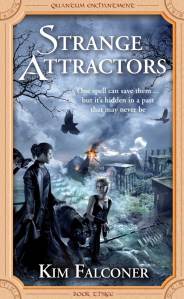
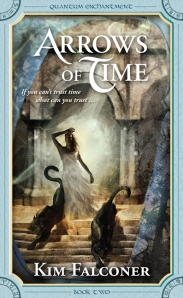
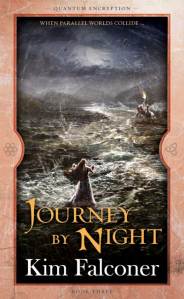
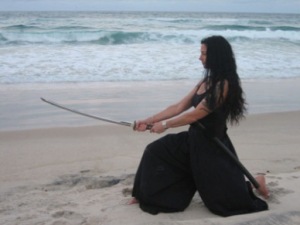

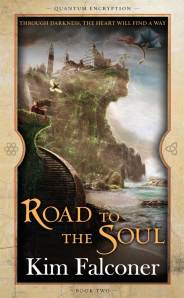
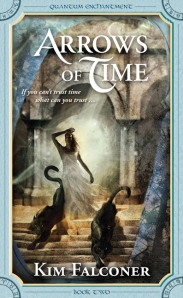
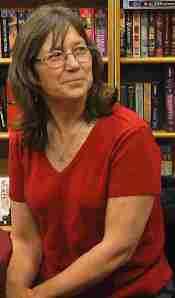



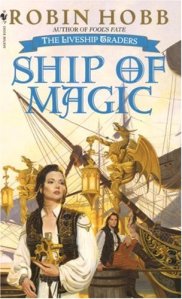



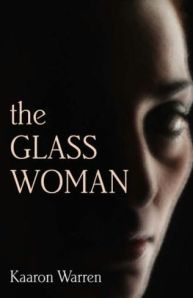




Meet Nalini Haynes, Editor of Dark Matter ‘Zine…
I have been featuring fantastic female fantasy authors (see disclaimer) but this has morphed into interesting people in the speculative fiction world. Today I’ve invited the talented Nalini Haynes editor of Dark Matter E-zine to drop by.
The production of fanzines and magazines by dedicated fans of the speculative fiction genre is an old and proud tradition. Back when the ‘zines were produced on paper smelling of spirits and printed in faded purple ink from the roneo machine, editors compiled articles, interviews, reviews and stories which examined and celebrated the genre. And they are still doing this today, only now they don’t have to worry about squeezing their ‘zine into X number of pages and they can include wonderful colour covers. We’ve come a long way from the roneo machine.
I would love to do a PhD in disability in SFF literature, but I haven’t been able to gain entry to a university to do a Masters as a lead in to this program or any other. I was effectively expelled by the University of South Australia because of being disabled after the Human Rights and Equal Opportunities Commission made a finding of disability discrimination against UniSA. In 2007 UniSA offered me $4000 as compensation for being permanently barred from further education and being gagged. This offer was made through HREOC. I was accepted back into UniSA after threatening to expose them on radio, then I was effectively expelled in 2008 after which their lawyer offered me $3086 with the same conditions. Disability access would have cost far less than the compensation I was offered, let alone the lawyer’s fees. I believe this has influenced universities’ handling of my applications for degrees since moving to Melbourne. I would love to undertake a PhD in disability in SFF literature – I’m collecting a list of books to reference – but I don’t hold out much hope of being accepted into a program.
My first memory of science fiction was watching Dr Who from behind my uncle’s chair when I was about 3 years old; it was a UNIT episode in black and white. I’ve loved science fiction and fantasy ever since. I started reading adult SF when I was 10 years old because Mum lent me her SF books when I was bored.
I worked on my high school newspaper. It wasn’t much fun because we had no autonomy, it was more like being given assignments, but I was interested in doing a newsletter.
In 2008 I was selected for the upstART program in the Adelaide Fringe Festival. I supervised my exhibition in the Fringe Factory for a few shifts, during one of which there was an exhibition/activity with zines in the next room. This reminded me of the school newspaper and showed me that zines were around, with a vibrant community.
A few months later we moved to Melbourne. I searched for some kind of connection to science fiction in Melbourne and found the Melbourne Science Fiction Club. I was appointed as editor of Ethel, the club’s zine, for one issue, during which time I discovered the amazing resources and potential of zines. After this, I decided that I didn’t need anyone’s permission to create a zine. I came up with a name then I contacted publishers telling them I was now independent and asking them if they’d continue to support me. I was off and running!
I’m pleased and surprised to have an international following. I try to have a balance between interviewing international and local authors. By promoting the local authors, I hope to share the bounty we have with our sibling geeks across the water, enriching our shared culture.
I’ve agonised over whether to keep DMF entirely positive – like SF Squeecast – or to balance the positive with the negative. Various people have argued from different positions, helping me shape DMF with some balance, including some negative reviews. I have been strongly encouraged to be more negative with a view to helping raise the bar or to ‘really rip into things’. I’m reserved with this because authors spend a huge amount of time writing their books, often while holding down a day job. If I feel the need to write a negative review, I spell out clearly and respectfully the reasons why I don’t like the book. If I feel that the target market will like the book but I’m not the target market, I’ll try to find a reviewer who is the target market. In the meantime, I write a review bearing this in mind.
On a more personal level, I hope to prove to myself and the world that ‘I’m a real boy’, with skills that are viable in the workplace (computer skills, reading, writing, editing etc). People tend to believe if you’re vision impaired then you’re incapable and incompetent. I’m trying to prove that’s not the case. I’m also hoping for an alternate career path to open up. Failing that, I’m keeping myself busy focusing on an area that I enjoy. I’ve never been the stay-at-home type although I did the full-time mum thing for a few years before studying counselling between child-raising, my son’s many operations etc.
Dark Matter is a positive focus for my time and energy, opening up a wonderful world of creativity and opportunity. One day I hope to make this a real (read: paying) job, or get a similar job elsewhere (that pays).
Q: You have a Master in Social Science from the University of South Australia. With a background like that you must be very tempted to write social commentary either in article format, or by using fiction to examine possible futures. What kind of stories do you write?
Recently I wrote a story about the thin veneer of civilisation, the inhumanity of man to man, called ‘Lighting the Way’. This story still needs more work; I was in Kelly Link’s writing class at Continuum (this year’s state and national SF convention) and received great feedback and lots of encouragement from Kelly and the other participants. I haven’t finished the story yet.
Jim Vinton asked me if I’d replace my eyes with cyber implants if it would give me 20/20 vision. My response: if it was proven to work, I would not have a choice because of the nature of definitions of disability; disability access would be closed to me unless I had that surgery. This got me thinking… what if I had that surgery imposed upon me? People don’t understand how I see: I perceive the world and cope better than I should be able to with my level of vision due to this being a life-long condition. No-one would have any understanding of the changes that this surgery could cause. I have studied psychology: when a limb is amputated, the brain structure changes, the area of the brain dedicated to that limb can be reassigned. What if I had this surgery and the reverse happened? What possibilities would open up to me? What are the potential ramifications? I have the entire story mapped out in my head in the style of ‘He says, She says’ the awesome ABC drama, I just haven’t put it to paper.
Back when the French were testing nuclear devices in the Pacific I wrote a short story about a woman who was eating fish regularly to ensure her baby would be healthy but…
I entered a public speaking competition where speakers were supposed to argue intelligently and emotionally about any topic of their choice. I talked passionately about genocide and prejudice, relating the Hutus and Tutsis to my Irish grandmother’s hatred of Catholics…
So yes, you’re spot on. I’m passionate about people and the human condition. I think good storytelling relates to us here and now in some way, whether it’s as role models, teaching, challenging ideas, exploring ethics and philosophy. Science fiction and fantasy is about people.
Q: In Dark Matter #9 you dedicated 25 pages to Gender in Publishing. You say: ‘If Jonathan Franzen writes a book about family it’s described as ‘a book about America’, whereas if a woman writes a book about family, it’s described as ‘chic lit’.’ You’ve promoted the Australian Women Writers’ 2012 Challenge. You’ve included interviews from male and female writers on the topic. The whole reason I started interviewing female fantasy writers was because US and UK interviewers seemed surprised to discover that I wrote fantasy. Have you had many responses to Dark Matter #9 yet, or is it too soon?
I haven’t had many responses to DMF9. This is the only letter that addresses gender parity or the AWW in any way, from a guy who isn’t really a fan of parity but is a fan of Sean McMullen. Between the lack of articles and the lack of letters, I am sad to say that issue 9 may stand alone in DMF’s attempt to tackle this issue.
Q: On the Dark Matter site there is a page dedicated to audio interviews. When you interviewed me at Sisters in Crime, you recorded us chatting, and later transcribed the interview and printed. Now this interview and others are up on the audio interview page. As an interviewer, what’s the difference between doing an interview that will be listened to as opposed to an interview that is transcribed and read?
HUGE. ENORMOUS. TERRIFYING.
Oh, you want specifics? 😉
An interview that will be transcribed and read can be much more casual. There doesn’t need to be a formal introduction at the beginning, so we can meet or chat on the phone and just casually get into the interview. An interview that is recorded for podcasting needs a formal beginning, an introduction to the author. I’m still getting my head around this. Recently I started interviews by just saying hello and thanks to the author I’m speaking to, but I think this needs to be expanded to a brief toast-master-style introduction. I’m also thinking theme music to lead in to the interview and close would be good, as well as audible credits like with other podcasts.
Sound quality is an issue when putting interviews up as a podcast. I was fairly casual when I interviewed you, putting my Dictaphone on the table so we could both be heard. This is detrimental to audio-pickup, so I’ve started using the Dictaphone microphone. This gives far superior sound for the interviewee but means anyone else is too quiet. Mikey, the amazing audio guy at NatCon2012, suggested I record my questions separately and edit them in so there isn’t a problem with interview questions being too quiet in contrast. This will take longer and require more editing, but it’s do-able, it’s much cheaper than buying good recording equipment and it’s easier than lugging good recording equipment around. The downside is that joint interviews won’t work – unless I get 2 dictaphones and do more editing…
More on sound quality: I’ve interviewed people in some interesting places like coffee shops and outside the Spiegel tent. Background noise can be a problem as well as interruptions. Some interviews’ sound quality is so poor they cannot be put online, I’ve struggled to interpret what was said when transcribing them. The other day I interviewed Yunyu for the second time over Skype and someone was talking in the background. Background noise issues are simply unavoidable unless I get access to a professional recording studio, which is not in the foreseeable future. I do the best I can with what I have and hope for the best.
In a transcribed interview it’s ok to go off-track, lose focus, or for people to say things that need to be edited out, like the classic, ‘Oh, wait, my publicist wants to release that information later, can we edit that out?’ In a recorded interview it’s important to stay on topic, to try not to ‘um’ and ‘ah’, and to keep things moving. Also to turn off mobile phones…
From all the above, you probably think writing up interviews is easier, but really it’s not. An hour interview can take 6 hours to write up effectively, more if the sound quality is poor or the person talks really quickly. That’s before editing, proof reading, sending it to the interviewee for proofing, checking and making changes when it comes back… It’s a huge amount of work. I love the actual interviewing part, it’s fascinating listening to people’s stories, but I am over some of the other aspects of the work. Seriously.
Q: Your cover Girl Torque (Dark Matter 3) was nominated for the Chronos Award. Do you also have a background in illustrating and which artists have inspired you?
Mum studied at the Tasmanian School of Art when I was a young adult. I fell in love with art school then, but the pragmatic side of me – the part that never wanted to go hungry again – wanted a real, paying job. That coupled with a desire to save the world resulted in me qualifying as a counsellor. As I finished counselling studies I rewarded myself by beginning a Bachelor of Visual Arts degree as a counterpoint to counselling people and then as a substitute for working after losing my job. I completed over a third of this degree at the University of South Australia with a distinction average due to working my butt off, but was effectively expelled for being disabled, unable to study theory or complete computer-oriented classes like Digital Art without disability access.
I’ve been in a few art exhibitions – selected and otherwise – and I was selected for the Adelaide Fringe Festival’s upstART program, an arts mentoring program for emerging artists. I won the Dawn Slade-Faull Award in 2008.
Girl Torque and the cover for Dark Matter issue 1 are about the only artworks I’ve completed since moving to Melbourne, apart from photographical works.
Artists who have influenced me would largely be friends of the family as I grew up, friends while Mum was at art school and lecturers at art school like Mark Kimber, Deborah Pauwee and Aurelia Carbone to name but three [I did mention I love photography J]. Andrew Hall was my painting mentor for the upstART program but I was using acrylics. I think I need to return to gouache, I find acrylics too heavy and I’m allergic to oils. Trina was my lecturer for drawing. I loved life drawing and Trina said that perhaps my poor vision was a blessing in disguise as I couldn’t see the finer detail that distracted others. I have contrast vision ‘within normal parameters’ as well, so that helps with shading and tonal qualities. I haven’t explored the world of SFF art much as I wasn’t really aware of fandom until after I moved to Melbourne, by which time I’d had the stuffing kicked out of me. Also there is a bias against SFF art as ‘illustration’ (read: not real art) in art circles.
Being nominated for the Chronos Award for my painting was a huge honour and complete surprise. I did my impersonation of a fish, opening and c losing my mouth, while I read the announcement page about three times, checked the url and so forth, until gradually it sank in that yes, I’d really been nominated for my artwork. I feel really self-conscious but also really encouraged by this nomination; I feel it’s a vote of confidence from others, encouraging me to take up paintbrush, charcoal and pastels once more. I should probably also put some of my fan art on the webz, like my charcoal drawing of Chianna that is sticky-taped to a wardrobe door in the [laughingly titled] studio [aka third bedroom with an east-facing window L]. Friends came over not so long ago and were given a tour of our bookshelves. I think they were more interested in the artwork in that room than the books on those particular shelves. 😉
losing my mouth, while I read the announcement page about three times, checked the url and so forth, until gradually it sank in that yes, I’d really been nominated for my artwork. I feel really self-conscious but also really encouraged by this nomination; I feel it’s a vote of confidence from others, encouraging me to take up paintbrush, charcoal and pastels once more. I should probably also put some of my fan art on the webz, like my charcoal drawing of Chianna that is sticky-taped to a wardrobe door in the [laughingly titled] studio [aka third bedroom with an east-facing window L]. Friends came over not so long ago and were given a tour of our bookshelves. I think they were more interested in the artwork in that room than the books on those particular shelves. 😉
Q: I was prompted to start this series of interviews because there seems to be a perception in the US and the UK that fantasy is a bit of a boy’s club. Do you think there’s a difference in the way males and females write fantasy?
Perceptions are that there is a difference between the way males and females write fantasy, but I grew up thinking Ursula le Guin was a guy. You could have knocked me over with a feather when I discovered Andre Norton’s Witchworld was written by a woman. I wish someone told me these authors were women when I first read their novels in primary school and high school respectively; I thought being published was effectively barred to women.
I think the stereotypical difference is that men write ‘hard fantasy’ (think A Song of Ice and Fire) while women write about relationships, often with a focus on romance, which has traditionally been looked down upon as soft fantasy.
Q: Following on from that, does the gender of the writer change your expectations when you pick up their book?
In contrast, the Wall of Night series by Helen Lowe has a variety of point of view characters, regardless of gender they come alive on the page. Relationships are important, sex is more than just scratching an itch and yet the act of sex does not make a couple. The first novel in this trilogy, Heir of Night, just won the Morningstar award, so instead of me spoiling the story read it yourself 😛
I’m reading a lot these days, so these differences are good. I try to vary my reading diet: Australian, overseas, serious, comedy, SF and fantasy… A change is as good as a holiday they say, and it certainly helps to re-energise me when I’m feeling a little burnt out.
Q: And here’s the fun question. If you could book a trip on a time machine, where and when would you go, and why?
This is the wrong question. The question should be: what is your preferred time machine and with whom would you travel? The answer: a blue police box. Christopher Eccelston.
Dark Matter’s website
Follow Nalini on Twitter
Catch up with Dark Matter on Facebook
Catch up with the other blog on DMF’s website: Nalini’s ‘life’ blog
Catch up with Nalini on Google+
Interested in Fanzines? Search here at E-Fanzines
Leave a Comment
Filed under Australian Artists, Australian Writers, E-Zines, Gender Issues
Tagged as commenting on speculative fiction, Dark Matter Zine, Disability in science fiction, editing, Nalini Haynes, Nourish the Writer